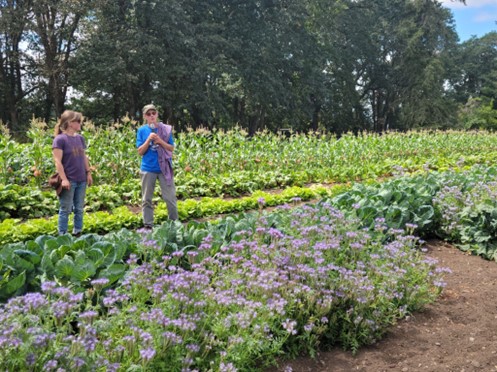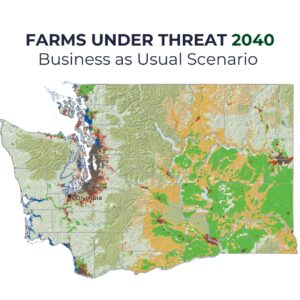Local Advocacy and the Future of Farmland Protection in Washington State
Why the 2022 Census of Agriculture should motivate communities to get involved in local planning for farmland protection

What does farmland mean for the future of communities in Washington?
“We are going to need to feed our communities for generations!”
“The diversity of crops and products that result from small farms becomes the fabric of our community. Less farming equals less community.”
“Agriculture does not just provide local food to the local community, but also maintains open space, preserves habitat for native and endangered species, and contributes to the local economy.”
“Once it’s gone, it’s gone forever. We need to bring farmland and farming back to the forefront and not continue to minimize the economic, climate, and ecosystem benefits.”
These are just a few thoughts shared by farmers and other farmland advocates at our recent training on Local Advocacy: Protecting Farmland in Washington.
Days before the release of the 2022 Census of Agriculture, a 5-year count of the most comprehensive agricultural data across the United States, American Farmland Trust convened food systems advocates from across the state to learn how to engage with local governments for farmland protection in Washington.
The 2022 census has revealed trends that should alarm everyone in agriculture. In fact, they should alarm everyone who depends on food. Farming continues to decline in Washington.
Since the 2017 census, we saw a 5.6% reduction of land in farms, with over 800,000 acres of farmland no longer in production. The total number of farms decreased by 10.4%, with the loss of over 3,700 farms.
The hardest hit were the smallest farms of less than 10 acres, which saw a 20.7% decrease. These small farm parcels are likely to be close to urban areas and vulnerable to being permanently lost to urban sprawl. Our Farms Under Threat research shows Washington lost nearly 98,000 acres of farmland to development between 2001 and 2016, mostly at the urban edge.
By 2040, we stand to lose another 192,000 acres if we don’t change this pattern. It makes us nervous to see the Legislature entertain bills like HB 2158, which would have required cities to expand their urban growth areas.

The census data for the age of farmers are also alarming. The average age of a farmer rose to 59.3 years. Washington saw a 5.1% decline in producers under the age of 35, while producers aged 65 and older grew by 13.2%.
For every six farmers old enough to qualify for Medicaid, there is only one young producer to take their place. Meanwhile, producers in the middle declined by 14.9%.
Policymakers desperately need to double down on efforts to not only recruit the next generation of farmers but also support farmers in all stages of their careers.
Access to land and agricultural services has historically been a disproportionate barrier for farmers of color, and changes in the Washington agriculture census varied across racial groups. For example, of the 62,387 producers across the state, Black farmers grew from a total of 90 to 118, a 31.1% increase. While much more needs to be done to support Black farmers, Washington goes against the national trend of an 8% decline. However, Hispanic and Latino farmers decreased by 6.1%, losing 179 producers, which is much more extreme than the 0.1% decline we see nationwide.
With just a few exceptions, these numbers from the 2022 census point to a crisis with our food systems. We need to listen to farmers, both new and experienced, and respond to the challenges they are facing.
The farmers in our advocacy training expressed that they are experiencing rising costs and diminishing revenue. Newer farmers struggle to access farmland due to rising land value. The inability to secure long-term land tenure makes it hard to invest in a farm’s long-term needs. Many farmers who do own their land do not have a plan for succession, leaving farmland vulnerable to the whims of the real estate market. Water availability is also an increasing concern, particularly in watersheds with overallocated water rights.
The results of the 2022 census should motivate people who care about the future of food systems. Right now, many counties in Washington are in the process of updating their comprehensive plans. These plans are the 20-year vision for the future of a community county. They can identify policies that protect farmland, support the agricultural economy, and lead to investments in infrastructure necessary for farming to succeed. The success of these local planning processes relies on communities that advocate for the things they want to protect.
A participant in our advocacy training perfectly stated a call to action: “Securing the future of farmland has value that needs to be included in future county planning – agriculture needs to be at the table!”
Now is the time to push our local governments to plan for agriculture and the future of food. Over the coming months, American Farmland Trust will convene stakeholders and survey farmers from across the Puget Sound region to develop an action plan and local policy toolkit to support the viability of agriculture. Our aim is that this work will be informative for local advocates, planners, and elected officials across Washington.

